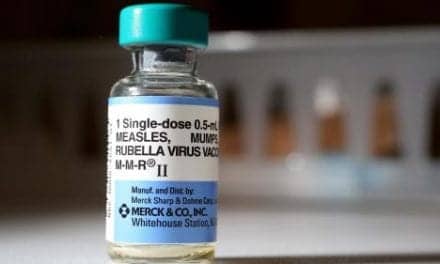Researchers at Saint Louis University are participating in a multi-site, National Institutes of Health-sponsored clinical trial in older adults of a new vaccine designed to protect against pneumococcal pneumonia and related diseases such as bloodstream infections and meningitis.
“We need to protect people against pneumococcal pneumonia. It’s a very nasty illness and can sometimes be fatal,” said Sarah George, the investigator of this trial at Saint Louis University’s Center for Vaccine Development. “As you get older, your immune system ages and you are at higher risk of getting pneumonia. And if you get pneumonia, you are at higher risk of being hospitalized or severely ill.”
According to the Centers for Disease Control and Prevention (CDC), more than 300,000 people are hospitalized for pneumonia in the United States annually. Many strains of pneumococcal pneumonia resist treatment from antibiotics, making an effective vaccination program a preferable option for keeping people from getting pneumococcal infections
Saint Louis University Center for Vaccine Development researchers are studying the most effective way to protect those who are older than 50 from pneumococcal pneumonia. Two FDA-approved vaccines protect against many diseases caused by pneumococcal bacteria, but only one can protect from pneumonia. The one designed to protect against pneumonia doesn’t appear to work as well in adults who previously received the older pneumococcal vaccine, which is recommended for adults age 65 and up.
The PPV23 (23-valent pneumococcal polysaccharide vaccine) has been used for 30 years to protect against invasive pneumococcal illnesses, such as meningitis or blood stream infections, but doesn’t prevent pneumonia, which is a much more common disease.
A newer vaccine, approved by the FDA last year, PCV13 Prevnar (13-valent pneumococcal conjugate vaccine)—protects against 13 strains of pneumococcal disease including pneumonia, as well as more invasive infections.
However, the PCV13 vaccine doesn’t evoke a strong immune response in adults who previously received the older PPV23 vaccine. After receiving the newer PCV13 vaccine, previously vaccinated adults tend to have a lower level of antibodies in their blood that help protect the body from pneumococcal bacteria than adults who never received the PPV23 vaccine.
“The new vaccine is better at preventing pneumonia if you haven’t had the old vaccine,” George said. “We don’t know the best way of using the new vaccine effectively in people who received the old vaccine. We’re trying to find out what is the right dose of the new vaccine for people who already had the old vaccine.”
The clinical trial compares the immune response in two groups of adults between 55 and 74 years of age—those who previously received a pneumococcal vaccine and are given one or two shots of the newer PCV13 vaccine and those who have never received a pneumococcal vaccine and are given one shot of the newer PCV13 vaccine.
“We have a substantial number of people who have received the PPV23 vaccine and would be eligible to receive the PCV13 vaccine,” George said. “We need to determine whether or not doubling the dose of PCV13 will overcome any anticipated decreased immune response in those who have received the PPV23 vaccine.”
Approximately 175 older adults are expected to participate in this study at Saint Louis University’s Center for Vaccine Development, one of eight Vaccine and Treatment Evaluation Units funded by the National Institute of Allergy and Infectious Diseases (NIAID), part of the NIH.
The trial is expected to enroll more than 880 participants at six Vaccine and Treatment Evaluation Units across the country. These include Group Health Research Institute in Seattle; University of Iowa Infectious Disease Clinic; Cincinnati Children’s Hospital Medical Center; Vanderbilt Vaccine Research Center; and Baylor College of Medicine.
Source: Saint Louis University Medical Center









